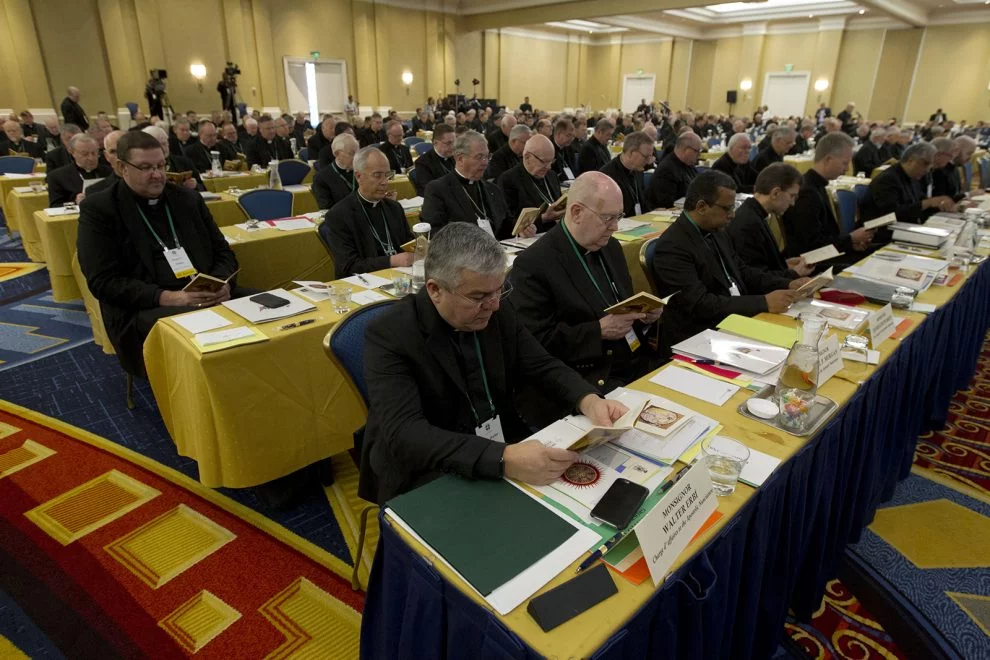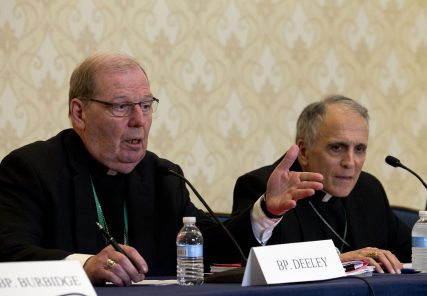Catholic Bishops Stop Short of Mandating Lay Involvement in Abuse Investigations
By Jack Jenkins
The U.S. Conference of Catholic Bishops has passed a slate of long-awaited measures designed to combat sex abuse and hold church leadership accountable for mishandling cases, including creating a national hotline operated by an outside group for reporting incidents of abuse or their cover-up. “I’m confident that the idea of doing (investigations) in-house is long gone,” said a cautiously upbeat Cardinal Joseph Tobin of New Jersey after the reforms passed Thursday morning (June 13) — informed by a recent papal document — at the bishops’ spring meeting. But the bishops stopped short of handing power to lay Catholics or abuse survivors in those investigations, sparking a debate that revolves around whether doing so would overstep guidelines outlined in a document issued by Pope Francis after a Vatican summit on abuse in February. Chicago Cardinal Blase Cupich and other clerics were able to insert language into the resolutions stating that metropolitan bishops — who would oversee the investigations of fellow bishops — “should” rely on qualified lay persons. The inclusion of lay people is also among a moral “commitment” the bishops adopted Thursday morning on how to deal with sexual misconduct. But the language fell short of requiring bishops to take lay input, an important distinction that left victims advocates saying stronger measures are needed. Other clerics, such as Bishop William Shawn McKnight of Jefferson City, Mo., made clear that they support lay involvement regardless. “I believe it should be mandatory that we involve laity in the investigation of any case of sexual abuse by a bishop — or corruption, cover-up, involving the same,” McKnight said during the second day of voting. “I believe we should do that because that is the Catholic thing to do.” He added: “Lay involvement should be mandatory to make darn sure that we bishops do not harm the church in the way bishops have harmed the church — especially what we have become aware of this past year.” McKnight pointed to a section of “Lumen gentium,” one of the main documents of the 1964 Second Vatican Council, which, McKnight said, outlines the “obligation of the laity to be involved in the most important matters facing the church.” “Who can deny this is not the most important matter now of our generation?” he said. When Tobin was asked about McKnight’s comments at a news conference later in the day, he argued the new resolutions established a system that de facto requires lay involvement, and he said a gathering of metropolitan bishops, meeting on Wednesday, all agreed they could not now conduct an investigation without qualified lay people. “The possibility of doing that without qualified lay people, I would say is next to impossible — it is impossible,” Tobin said.
Bishop Robert Deeley of Portland, Maine, also insisted that lay involvement was already effectively baked into the process, saying, “I think that it’s already done.” But the resolutions are a far cry from proposals considered when the bishops last met in November, such as the suggestion of creating an independent nonprofit to oversee abuse cases — an idea shot down by Vatican officials who said it superseded the authority of the pope. The new reforms also did not impress advocates such as Becky Ianni, an abuse survivor and leader of the Washington, D.C., and Virginia chapters of the Survivors Network of those Abused by Priests. Saying this week’s measures “aren’t going to change anything,” Ianni argued that the systems created by the bishops are simply “setting up new policies where (the church) is going to investigate itself.” Encouraging metropolitan bishops to appoint lay people to help with investigations, she added, is not the same as an independent process. “Anytime they can handpick the lay person, then that’s not independence,” she said. “We would really like them to contact their local attorney general and get three to four suggestions for experts.” In the meantime, she said, SNAP will continue to rely on civil authorities rather than the church to take action. “We have 20 attorneys general that are doing investigations (into Catholic sex abuse). We’re going to put our emphasis on getting the other 30 states to do the same.” Kim Smolik, CEO of Leadership Roundtable, a group consisting mostly of influential Catholic laity devoted to promoting better management in the church, said in a news release that she hopes the provisions are just the beginning of a lengthy process of reform. “A new culture of leadership is necessary if we are to truly address the crises,” Smolik’s statement said. “It starts by acknowledging the leadership failures, looking at the root causes, providing new formation in seminaries and other educational institutions, setting up governance structures with checks, balances, etc.”
|
.
Any original material on these pages is copyright © BishopAccountability.org 2004. Reproduce freely with attribution.

